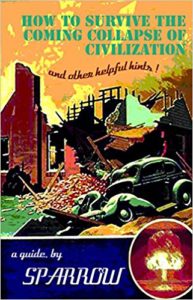How to Survive the Coming Collapse of Civilization (and other helpful hints!)

How to Survive the Coming Collapse of Civilization (and other helpful hints!),
by Sparrow, The Operating System,
2016, paper, 163 pages, $18.00,
ISBN: 0986050555
For many in the U.S., waking up on November 9, 2016 felt like the end of the America they knew. Though Sparrow’s guide was composed prior to the election of our current president, it is a useful document to help us survive this contentious political climate.
“The Apocalypse will come in the form of a re-
ality TV show.”
— Michael Douglas
Taken from the third section of Sparrow’s book, entitled “Fake Wisdom,” this fake quotation might be called prophetic. How could Sparrow, the venerable New York “anti-poet,” have known that we would be talking about “fake news” on a daily basis just months after his book’s debut? How could he have known that our country would become a kind of reality TV show?
While How to Survive does not masquerade as a book of poems, the clarity of language is delightful and funny. Frankly, Sparrow’s How to Survive is better than poetry right now, because we need words that brighten our spirits and offer us ways to be resourceful as each day brings new threats to things that we love.
How do we become a civil society again after years of divisive debate and finger-pointing? Sparrow suggests that we practice light-hearted activism:
207) WELCOME EVERYONE.
Wherever you are, welcome newcomers. If you’re
waiting for the dentist and someone enters, say,
“Welcome to this waiting room!”
Most people will be annoyed, but a few will remember
you the rest of their life.
After the collapse of civilization, we will need new skills, and this guide provides a range of options for the personal and public spheres. Perhaps you’re a bit of an introvert and can’t imagine welcoming everyone to a waiting room. You might try to:
242) BECOME A CONSPIRACY THEORIST.
Choose a murder from yesterday’s newspaper.
Investigate how this killing connects to organized crime,
the CIA, Donald Trump, etc.
[Note: Write all your information in a blog entitled
“The Bare Truth.”]
Sparrow’s recommendations often caused me to burst into spontaneous laughter, but the humor veils a serious message, which seems to be that if we don’t learn to be human again, we cannot survive what the future will bring. As we witness the dismantling of the progress we have made over the last century, we might consider this Fake Wisdom:
“If racism ended, the capitalist system
would disappear in three weeks.”
— Eugene V. Debs
If we really take in that statement, it becomes clear what is at stake. While the quotation is fake, its intertwining of racism and capitalism is real, and this book offers some serious contemplations for the historical moment we find ourselves in.
While How to Survive the Coming Collapse of Civilization pretends not to be poetry, in the appendix, Sparrow describes his poetic lineage and practice in great detail, offering deeper insight into the process-orientation of this “anti-poet”:
Socialism and anarchism must be continually
reinvented, the way Christianity must always be reborn.
I want to produce an artifact that looks like a jokebook —
partly because it is a jokebook — but that also transforms
lost Ohioan kids into dangerous visionaries. These kids,
who take heroin, sniff glue, skateboard, listen to “noise
sonatas,” wield tremendous power, once they turn from
self-destruction to luminous revolution.
So if this book is written for the nihilist in all of us, the title is a ploy to get us to pick up the book. It worked on me.
The forms of instruction are familiar and do not necessarily require a poetic lens, which makes them appealing to almost any reader with an interest in dismantling capitalism in favor of something like mutualism. Sparrow uses such forms to offer us new ways of thinking about the poem. These “poems,” whether they be one word long with a title or an elaborate set of instructions, deconstruct the capital of the poem itself, leaving us without our usual reference point of the lyric. Without this anchor, the poems ask us to navigate new terrain, just as the book asks us to consider new visions for the future.
— Cathleen Miller

